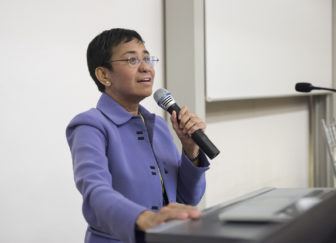
Maria Ressa warned that if social media platforms didn’t fix the fake news problem they were likely to be legislated, which is bad for free speech. Photo: Madelene Cronjé
We’re not in a post-truth world just yet, but we are in a space where truth is inverted and perverted. Scarier still, there are no clear solutions to make sense of our altered reality.
The “Fighting Fake News” session at GIJC 2017 was glaring in detailing just how pervasive, personal and damaging fake news is. Its scale and speed of spreading and taking hold is frightening.
From panelist Lee Mwiti detailing the threat to free and fair elections in Kenya, to Arta Giga talking about misrepresented facts in Latvia, to Maria Ressa in the Philippines fighting vicious trolls, to Anya Schiffrin‘s United States where her president has made “alternative facts” and “fake news” everyday terms, it’s clear social media has become weaponized. The panelists agreed that it’s also clear that it’s deadly and is racking up casualties.
Mwiti said there was still a lack of solid data on the continent, which in itself was a form of misinformation.
“More than a third of Kenyans said that widespread deliberate misinformation was denying them the information needed to make an informed vote,” he said.
Giga warned that the absence of information was one form of fake news, just like the trends in her country of manipulated content and staged content making the rounds on social media platforms in Latvia.
Schiffrin, who is director of the Technology, Media, and Communications specialization at Columbia University’s School of International Affairs, said fake news in all its different forms had gone beyond a rumor mill and has become a digital poison capable of changing people’s belief systems.
“It has got to a point that people don’t care if it’s fake news, they will still pass it on,” she says of how fake news fuels echo chambers.
Her fellow panelist Ressa, who is CEO and Executive Editor of Rappler in the Philippines, was unequivocal in saying that combating fake news had become the problem of our time.
“The social media platforms have become king makers and the gatekeepers, we journalists don’t have that role anymore,” she said.
And this inversion and perversion of roles means that some old style tools are just not useful to combat fake news.
“Fact checking is an old-world solution to a new world problem and we know fact checking is not working,” she said. But she added: “What does not change is that we do still have to be journalists who uphold ethics and standards and that we correctly influence the next generation of journalists.”
Ressa said that she was getting 90 hate messages an hour after Rappler exposed President Rodrigo Duterte’s online propaganda machine.
Ressa mapped out a three-pronged strategy to take on fake news. First it’s about throwing the problem back to the platforms like Facebook, Twitter and Instagram forcing these companies to fight fake news through technology. It’s about reconfiguring the algorithms that have driven everything from the chase for clicks as journalism to the viral spread of fake news, bots and trolling.
“If the platforms don’t fix the problem then they stand to be legislated and that’s censorship, and that’s not good for journalists either,” she said.
Second, she said it’s about education, civic engagement and awareness-building for media literacy and, in the long run, fighting fake news is about developing an education system that ensures future generations are better equipped to be masters of technology, not victims of it.
It’s a bleak picture, it’s war even, but Ressa isn’t given up hope just yet, she’s just re-arming, getting to know the enemy better as she says all journalists should do.
“We still have to be good journalists, we just have to focus on the new battlefield in the virtual war,” Ressa said.
Thinking Through Ways to Combat Fake News
- Expose bots, paid trolls and propaganda networks.
- Fight for more social media data to be made publicly available.
- Pressure social media companies to change algorithms using the technology they’ve created
- Time to consider regulation and new policy?
- Use personal influence to reach out to those who spread fake news.
- Increase education, awareness and nurturing critical thinking.
 Ufrieda Ho is an independent journalist based in Johannesburg. She is author of Paper Sons and Daughters.
Ufrieda Ho is an independent journalist based in Johannesburg. She is author of Paper Sons and Daughters.
 Madelene Cronjé is an independent photographer based in Johannesburg, South Africa. Formerly a staff photographer at the Mail and Guardian, she specializes in photojournalism and editorial portraiture.
Madelene Cronjé is an independent photographer based in Johannesburg, South Africa. Formerly a staff photographer at the Mail and Guardian, she specializes in photojournalism and editorial portraiture.
